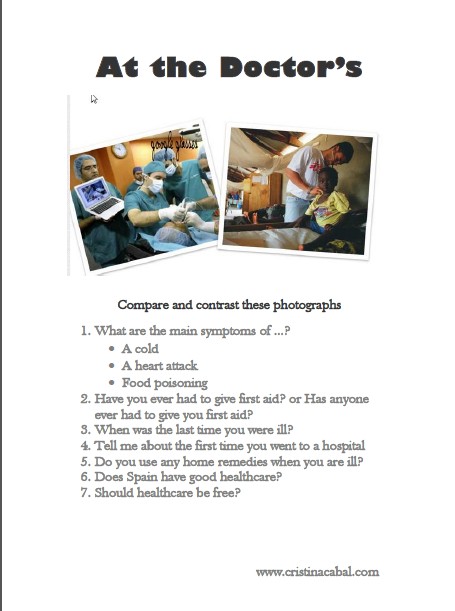Every time time I need to write something related to Medicine I cannot but think my father is smiling at me from up above. He wanted me to be a doctor but even though I might have done it, just to please him, the truth is that I would have made an awful physician as , unfortunately, my knees still go weak whenever I see blood or someone happens to mention the gory details of an accident or operation. Well, that’s me!, the proud daughter of the best doctor ever, who cannot even stand the sight of a needle!
So, daddy, here it is, another post in your memory!!
Sick vs Ill
♥Ill is often used to mean ‘unwell‘ in British English. In American English ill is unusual except in a formal style. Note that we use ill after a verb.
She is ill.
♥In Attributive position (before a noun), many British people prefer to use sick. Sick is also the normal informal American word for unwell.
The President is sick.
♥Be sick can mean ‘vomit‘.
I was ___ three times during the night
The problems faced by mentally ___people need to be dealt with
His mother is seriously ___ in hospital
Toothache vs A Toothache
♥ Illnesses are usually uncountable in English, including those ending in -s : measles, flu…
But some more common minor ailments such as: a cold, a headache, a sore throat, a nose bleed, a cough, a rash… are countable, ie, they take the indefinite article (a,an)
♥While in British English, toothache, earache, stomach-ache and backache are uncountable. ( I have earache) in American English , they are generally countable if they refer to particular attacks of pain.
Compare:
I have toothache (BrE) // I have a toothache (Am E)
(Source Practical English Usage – Micheal Swan)
Ache vs Hurt
♥ What ‘s the difference between My leg hurts and My leg aches?
If your leg aches you have a continuous, dull (not intense) pain.
If your leg hurts, it is often stronger and sudden. Ex. Ouch! My leg hurts!
♥On the other hand, ache is used both as a noun and as a verb whereas hurt is only used as a noun.
I have a(n) ___ in my stomach
The pain in the small of his back was worse and there was a dull __ in his arms
I ___my hand on that broken glass
He ___ my feelings by ignoring me
And, now that we are on the subject, how do you fancy answering some questions about this issue? If you need to revise the vocabulary , click here




 I can keep on pretending this hot weather is going to last. On Sunday 27th October , our clocks will
I can keep on pretending this hot weather is going to last. On Sunday 27th October , our clocks will  to the list of reasons why I like this site. Word Hippo is very simple to use and everything is on the same site.
to the list of reasons why I like this site. Word Hippo is very simple to use and everything is on the same site. level. It all started with a text my students had to read about a
level. It all started with a text my students had to read about a
